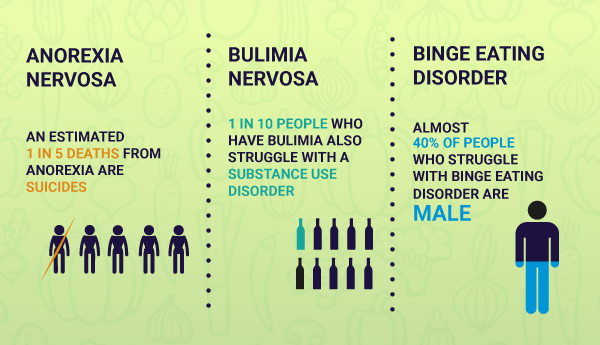Our Eating Disorder Recovery Ideas
Wiki Article
Eating Disorder Recovery Fundamentals Explained
Table of ContentsThe smart Trick of Eating Disorder Recovery That Nobody is DiscussingThe Best Strategy To Use For Eating Disorder RecoveryEating Disorder Recovery - TruthsSome Known Questions About Eating Disorder Recovery.Eating Disorder Recovery Can Be Fun For Everyone
:max_bytes(150000):strip_icc()/eating-disorder-5200354-DD-Final-c0a1c0ab5fcf4ddbb2457a87b3acfd8f.jpg)
Orthorexia is a type of eating condition, still unknown in the DSM, where a person ends up being obsessed with "healthy eating." While many people emphasize to be aware of the ingredients and sourcing of their food, orthorexia can come to be damaging to the person's wellness. Orthorexia creates people to recognize details food or food teams as "correct," "healthy and balanced," or "pure." Ultimately, particular foods or whole teams are removed from the person's diet plan; they might also begin to consume over the ingredients in their foods, investing hrs daily preparation dishes (eating disorder recovery).
Food active ingredients could additionally end up being the person's only subject of conversation. Orthorexia is also a common co-occurring disorder linked with OCD.
Not known Incorrect Statements About Eating Disorder Recovery
With this disorder, an individual will strictly stay clear of particular foods to the hinderance of their health and wellness - eating disorder recovery. Unlike orthorexia, nevertheless, the evasion of specific foods isn't driven by ideas of the food's healthfulness or pureness, but rather by an extreme aversion to the food's taste, structure, or odor (although issues concerning perishing or food poisoning may likewise exist).Gradually, a growing number of foods become untenable, resulting in a very limited palette of acceptable foods. Previously referred to as careful eating problem, ARFID often begins in childhood and also considerably intensifies gradually. It's reasonably common for children to be "fussy eaters" as well as every person has choices wherefore they consume, yet if it becomes compulsive and also detrimental to a person's health and wellness, it necessitates a check-in with an eating problem therapy expert.
Like orthorexia, a negative or distorted body image is not necessarily a cause of the problem. ARFID is typically treated using talk therapy and also cognitive re-training such as Cognitive Behavioral Treatment (CBT). Unlike most eating disorders which generally initially existing during teenage years, rumination disorder is most usual in infancy as well as very early childhood, although it can linger right into the adult years.
The Single Strategy To Use For Eating Disorder Recovery
Normally, they do not experience stress and anxiety or disgust when throwing up, neither do they appear to make an initiative to vomit (as seen in bulimia nervosa). Rumination problem is often a reaction to an illogical worry of health problem brought on by consuming, although its reasons are less well-understood than other eating disorders.

Orthorexia is a type of eating disorder, still unrecognized in the DSM, wherein an individual becomes consumed with "healthy and balanced consuming." While numerous people emphasize to be familiar with the ingredients as well as sourcing of their food, orthorexia can come to be damaging to the person's health. Orthorexia creates people to identify certain food or food groups as "correct," "healthy," or "pure." Eventually, specific foods or entire teams are eliminated from the person's diet regimen; they could additionally begin to stress over the components in their foods, spending hours every day planning dishes.
Eating Disorder Recovery for Beginners

With this problem, a person will strictly avoid particular foods to the hinderance of their wellness. Unlike orthorexia, nonetheless, the avoidance of specific foods isn't driven by concepts of the food's healthfulness or purity, but instead by an extreme aversion to the food's taste, structure, or smell (although concerns about wasting or gastrointestinal disorder may also be existing).
Over time, increasingly more foods end up being illogical, leading to an incredibly minimal scheme of appropriate foods. Formerly called selective eating problem, ARFID frequently begins in youth as well as progressively aggravates gradually. It's relatively common for children to be "particular eaters" as well as every person has choices for what they consume, but if it ends up being compulsive as well as destructive to an individual's wellness, it requires a check-in with an eating problem treatment expert.
The smart Trick of Eating Disorder Recovery That Nobody is Talking About
Additionally like orthorexia, an adverse or distorted body picture is not always a source of the disorder. ARFID is usually treated making use of talk treatment as well as cognitive re-training such as Cognitive Behavioral Treatment (CBT). Unlike a lot of eating conditions which normally initially present during adolescence, rumination problem is most usual in infancy and very early childhood, although it can persist into adulthood.Normally, they do not experience stress and anxiety or disgust when throwing up, neither do they show up to make an initiative to vomit (as seen in bulimia nervosa). Rumination condition is commonly a response to an unreasonable anxiety of illness triggered by eating, although its causes are less well-understood than various other eating disorders.
Rumination condition is provided in the DSM-V. Among one of the most dangerous kinds of consuming problem, ED-DMT1 (informally called diabulimia), happens when a person with type-1 diabetic issues intentionally misses their insulin dose to slim down. Diabulimia is noted as one of the lots of unspecified read here consuming conditions under the catchall term OSFED (Other Specified Feeding r Consuming Disorder).
Report this wiki page